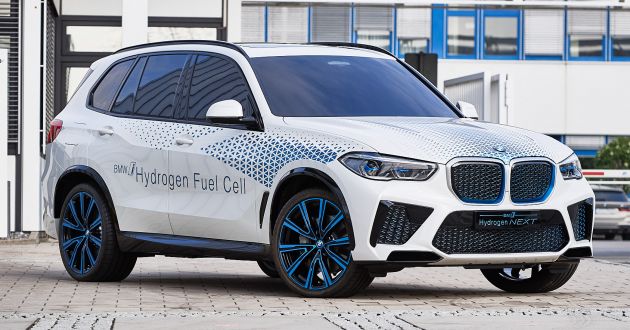While battery electric vehicles (BEVs) are a big part of BMW’s plans for the foreseeable future, the German carmaker is also developing other CO2-free drive technologies, namely vehicles powered by hydrogen. In the past, the company has presented a few vehicles that are based on this technology, including the Hydrogen 7 and 5 Series GT Hydrogen.
In September 2019, BMW presented the i Hydrogen NEXT, which is its latest hydrogen fuel cell development vehicle based on the current G05 X5. The company has now announced that it will pilot a small series of the model from 2022, although it has no plans to offer any to customers. This is because the company says there is still a lack of hydrogen filling infrastructure and major regions in the world are still working on improving the conditions for hydrogen fuel cell vehicles (FCEVs).
BMW acknowledges that FCEVs offer a number of advantages over BEVs, as they are most suited for customers who frequently drive long distances, require a great deal of flexibility or do not have regular access to electric charging infrastructure. Additionally, refuelling a FCEV takes just a few minutes, similar to cars powered by conventional fuels like petrol and diesel.
On the i Hydrogen NEXT, the fuel cell, which is where hydrogen combines with oxygen from the air to produce electricity and water, is located at the front where an internal combustion engine would normally be. The fuel cell generates 125 kW of energy for the rear electric motor, the latter being the same fifth-generation eDrive unit found in the iX3.
Along with a high-voltage battery positioned above the electric motor that serves as a performance buffer and provides additional dynamics for acceleration, the total system output is 275 kW (374 PS). Meanwhile, two 700-bar CFRP tanks, which hold up to six kg of hydrogen for the fuel cell, guarantee extensive range in all weather conditions and can be refilled in just three to four minutes.
The essential components for the hydrogen-electric system installed in the SUV will be produced by the Lightweight Construction and Technology Centre (LuTZ) in Landshut. This facility was also responsible for the technology that went into the Hydrogen 7 and serves as a statement of intent that the company is preparing for alternative CO2-free drive technologies.

























The post BMW i Hydrogen NEXT pilot programme due in 2022 appeared first on Paul Tan's Automotive News.



0 Comments